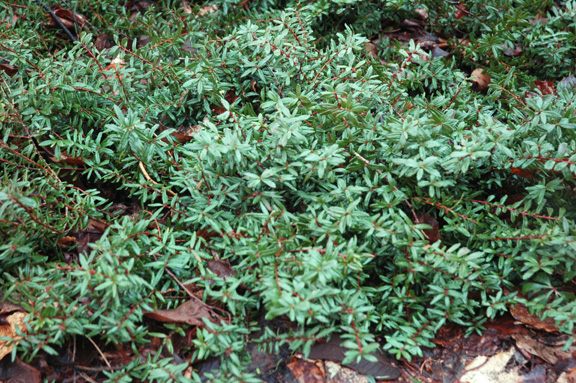
Woody > Paxistima > Paxistima canbyi > Paxistima canbyi
Paxistima canbyi
Canby Paxistima, Rat-stripper, Cliff Green, Mountain Lover
Origin: Central Mountains of Eastern the United States.
Mike's
Opinion


"
Canby Paxistima can survive in harsh climates on alkaline soils. It is excellent as a ground cover because of its compactness and dense form.
Michael Pascoe, NDP., ODH., CLT., MSc. (Plant Conservation)
"
| Family |
| Celastraceae |
| Genus |
| Paxistima |
| Species |
| canbyi |
| Category |
| Woody |
| Type |
| Shrub (evergreen) |
| Pronunciation |
| USDA Hardiness Zone |
| 3-7 |
| Canadian Hardiness Zone |
| 2-6 |
| Temperature (°C) |
| -30 to 30 |
| Temperature (°F) |
| -40 to -15 |
| Height |
| 30 cm |
| Spread |
| 50 cm |
Photographs
Description and Growing Information
Flowering Period
| General Description |
| This small low growing evergreen shrub has lustrous dark green foliage in the summer. In the winter, the foliage turns slightly bronzish colour. |
| Landscape |
| This low growing specimen is great as an evergreen ground cover. Makes an excellent facer plant, or a low hedge. Very tolerant of high pH soils. |
| Cultivation |
| This plant likes moist soils but it can tolerate full sun however it thrives in partial shade. Can handle high pH soil levels. It is very successful growing on calcareous soils. |
| Shape |
| This low growing evergreen shrub is quite small, usually found mat like as an understory specimen. |
| Growth |
| Slow |
| ID Characteristic |
| This plant has decumbent branches which often root when in contact with the soil. Most commonly planted with other low growing shrubs in rock gardens. |
| Pests |
| It may suffer from leaf spot and scale. |
| Habitat |
| Grows mostly on calcareous soils and rocky locations. Native to the Eastern United States. |
| Bark/Stem Description |
| Bark has no ornamental value since it is well hidden by the foliage. However if you trim the lower branches you will expose papery strips of bark exfoliating down the branch. |
| Flower/Leaf Bud Description |
| Buds are solitary, sessile, ovoid, very small, with about 2 pairs of exposed scales; the terminal bud is somewhat larger with more visible scars, 3-7mm in size. |
| Leaf Description |
| Opposite, simple, evergreen, 3-4 cm in length and 5-7 mm in width. The leaves are very dark green in colour, and have a waxy look to them. |
| Flower Description |
| Flowers are perfect, greenish or reddish in colour; not showy. Flowers are from 1 cm in length and 1 cm in width, and are borne in late May. |
| Fruit Description |
| Fruit is very small and is a reddish colour. Very leathery in texture, 2 valved capsule, 5-7 mm in size. |
| Colour Description |
| Lustrous dark green in the summer months and bronzish in the winter months. The bark is a light brown in colour. |
| Texture Description |
| Bark is fine textured. |
| Propagation |
| Propagated easily by division of the root ball which usually takes place in early spring. Cuttings are easily adaptable but growth will be slow. Cuttings are usually taken in early spring. |
References
J and J Craft Gardening Centre, Langton, Ontario.
